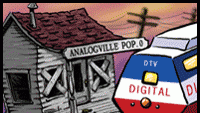What's in a name?

DTV problems
To the editor:
I take exception with your comment that there is no demand for LPs, likewise analog TV. Just a reminder, analog TV sets and VCRs outsell digital TV sets and digital VCRs by a ratio of about two million to one. There is no visible diminishing of demand for analog TV sets. And comparisons to audio devices or DVD/CD vs. VHS or LPs may illustrate your point, but are poor comparisons in actual sales or demand. DTV may be here but the consumer is not buying it. The consumer is buying DVDs and big-screen TVs, but not many ATSC-compliant receivers. It is still hard to find any store showing or selling more than one or two ATSC receivers, and many have none on display. There are lots of HD monitors, or big-screen sets with analog tuners. I expect to be long retired 25 years from now and still watching analog TV on eight of the nine TV sets in my house. Only one is ATSC-HDTV. And local broadcast signals are usually worse in HD than NTSC because of artifacts, source media noise and the ability to see even more grunge through a wider pipeline. The grass still looks like a sheet of plastic — not blades of grass — and fast action and pans still dumb down to smears or jerks or blocks. All much less watchable than the analog companion signal. “The Simpsons” still has frozen film dirt and gate hairs, the multiplex channel still looks like VHS copies of VHS copies, and the power reductions mean I can only get some DTV stations part of the day and CBS usually not at all. I watch a distant market UHF station because local channels 2 and 3 (DTV) are unwatchable 90 percent of the time. A grade 3 picture from 80 miles away in NTSC is still better than blue screen, broken audio, fractured pictures or grade 1 analog from a crap antenna on the Hancock 30 miles away. Long live analog TV. It works.
Henry Ruhwiedel
Crown Point, IN
To the editor:
The only reason that stations in this country are on the air with a digital signal is that someone decided to get rid of all the analog stations, auction all the frequencies and make a bundle. That's not going to happen soon. I bet there will be analog stations still on the air 15 years from now. A good friend who's a chief engineer told me that his station is on the air, but only one person associated with the station even has a digital set. In most cases, no one knows how good or bad the digital signal is, or how far it goes. Why would I buy a digital set with no tuner, so I can spend another $200 or more for a box on top of my television, and then find out that the signal off the air stinks? I will close by asking one question: How many digital antennas have you seen on homes where you live?
George G. Spellman
Choosing a name
To Paul McGoldrick:
Get the TV Tech Newsletter
The professional video industry's #1 source for news, trends and product and tech information. Sign up below.
Just finished reading your enjoyable article regarding company names. I've had this theory for quite some time that for the most part, successful companies (last name, acronym or invented name), or at least well-positioned companies, consist of a name with three syllables or fewer, or three words or fewer. Hence, the 17,576 three-letter combinations available work because that's what we're used to remembering.
Pop music execs have utilized this theory in promoting groups — Stone Temple Pilots (now referred to as STP), Three Doors Down, or Third Eye Blind come to mind.
However, in order for a company named for the owner to be well-positioned, the owner must have a short, common, highly recognizable and memorable name. Orban, Leitch, Gates and Moseley fit the bill, but some of the names of folks I know (Bobrzynski, Mruk, and even mine, Ziemski) would never be remembered by the public at large, even though they passed the three-syllable test. Looking around the studio today, I see Sony, Panasonic (okay, there's a successful polysyllabic one), TASCAM and Mackie. The name is important, but quality, reputation and service (hey, “QRS” — don't bother…they've been in business since 1988), as well as a product's timeliness, usefulness and value, also play important roles in determining a company's success.
Mike Ziemski
Producer, “Accent on the Air”
Recent Freezeframe winners
The October 2002 Freezeframe question, “Who was the famous broadcaster who promoted Chyron products, and where did he work when he wasn't promoting products?” resulted in a large number of correct answers. The late Julius Barnathan, president of Broadcast Operations and Engineering for ABC, was well-known in the industry. Shown below is an abbreviated list, displaying the names of winners chosen at random:
David Horowitz
Cindy Hutter
Harvey Caplan
Tom Weems
Mike Snyder
